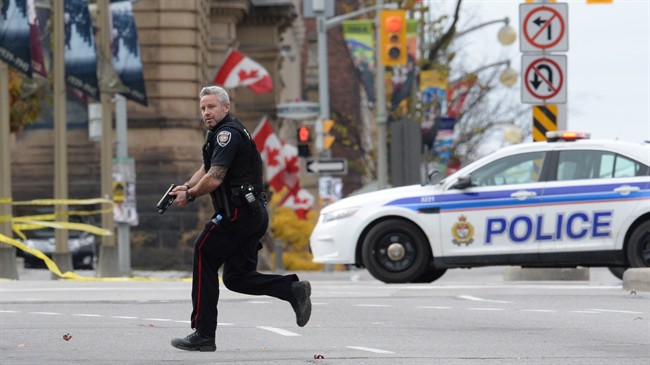TORONTO – In the midst of chaos following Wednesday’s shooting at Parliament Hill, social media lit up.

Word of the fatal shooting at the National War Memorial – and the firefight that erupted in the halls of Parliament shortly after – spread to all corners of the web, as citizens and journalist alike worked to piece together what was happening in the country’s capital.
As a result, many Twitter users began reporting the location of officers on the ground and sharing images of snipers who had armed the roofs of many nearby buildings.
What they may not have realized is those tweets could have impeded police efforts.
READ MORE: Soldier killed in what Harper calls ‘terrorist’ attack in Ottawa
“You can help protect our officers responding to attack downtown! Do not tweet their locations or pictures of where they are located,” tweeted Ottawa Police Sgt. Iain Pidcock during the height of Wednesday’s chaos.
Some liken it to tweeting about a R.I.D.E. program location – theoretically, it may defeat the purpose of surprising drivers who are drinking and driving.
Police worry that in active police investigations, suspects may turn to social media for information about where officers are located, or where road blocks are set up, in order to get away.
That concern was amplified during the lockdown in Ottawa Wednesday, as speculation regarding multiple shooters began to emerge.

Get breaking National news
READ MORE: What we know so far about Michael Zehaf-Bibeau
Ottawa Police said Thursday they are now confident there was only one shooter involved in the attack. Sources identified the suspected shooter as 32-year-old Michael Zehaf-Bibeau who was known to Canadian authorities.
This isn’t the first time citizen reporting has sparked concerns for police.
In June, RCMP urged Moncton, N.B., residents to not disclose any information about police operations or whereabouts during the manhunt for Justin Bourque, after he shot and killed three officers and wounded two others.
Similar scenes unfolded following the Boston Marathon bombing, as police conducted a massive search for suspects Tamerlan Tsarnaev and Dzhokhar Tsarnaev.
Communications expert Vincent Mosco said users tweeting police whereabouts is become a growing issue with social media. But the Queen’s University professor added it didn’t have as big of an impact on the Ottawa shooting.
“In Boston it was quite important for people to stop informing others of the location of police because they were involved in a city wide manhunt,” said Mosco.
WATCH: Moment of silence in House of Commons for fallen soldier
Mosco said this is due to the fact that there was so much accurate information being shared during the investigation – a rarity for social media.
“I think the big difference was in this case the concentration of trained journalists on the Hill contributed to a more informed social media,” he said. “More so than in areas where people taking to social media are less skilled and vent panic.”
But Mosco said that social media users should be aware of how their tweets can affect the outcome of police investigations.
“My observation is that we are in the early stages, but are learning, to use social media in a more mature way,” Mosco said.
“My fear is that we will get so worked up over misuses of Twitter that it might, given situations like this, prompt authorities to close it down.”






Comments